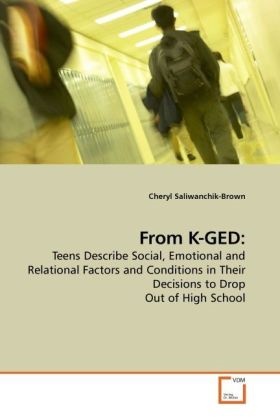Ulteriori informazioni
Thirty-three percent of teenagers who enter high school in the United States do not graduate with a traditional diploma. Many who drop out of conventional high schools choose to take the General Educational Development (GED) exam. With numbers of teenage GED recipients on the rise, reasons for the shift in teenage recipients is unclear. Using primarily qualitative research methods, this dissertation attempts to uncover some factors and conditions in Maine teens'' decisions to leave high school and opt for the non-traditional graduation. Many of the conditions that influenced these decisions were social; poverty, mother as sole care-giver, in-school bullying and exclusion, emotional; abuse at home, persistent loss of friends or family due to death, break-ups, several transitions to new school districts, and relational; no established relationships with adults and/or peers at home, in school or in community. "You mean, if someone had cared?" is a prevalent theme in youth''s interviews. This dissertation reveals their personal stories about their schooling and home lives from Kindergarten to the point of dropping out and seeking their GED.
Info autore
Cheryl Saliwanchik-Brown, Ed.D, is a 2009-2010 AAUW Fellow. She teaches courses in At-Risk Education at the University of Maine and co-directs the Wassookeag Learning Community, a new concept in education for non-traditional families. She has worked in education for over 15 years. She resides in Orono, Maine with her son and several pets.

